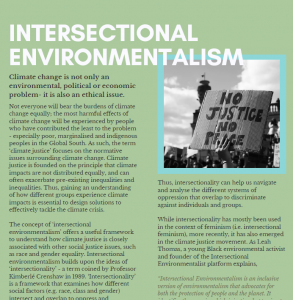
Climate change is not only an environmental, political or economic issue, it is also an ethical one. Why? Because not everyone will be hit equally hard by the climate crisis; the most harmful effects of climate change will be experienced by people who have contributed the least to the problem – especially poor, marginalised and indigenous peoples in the Global South. As such, the term ‘climate justice’ focuses on the normative issues surrounding climate change. Climate justice is founded on the principle that climate impacts are not distributed equally, and can often exacerbate pre-existing inequalities and inequities.
‘Intersectionality’ is a framework that examines how different social factors (e.g. race, class and gender) intersect and overlap to oppress and discriminate against individuals and groups. The term was coined by Professor Kimberlé Crenshaw in 1989. Crenshaw argued that social factors such as race and gender should not be considered in isolation because they overlap to produce unique modes of discrimination.
Thus the concept of ‘intersectional environmentalism’ offers a useful framework to understand how climate justice is closely associated with other social justice issues, such as race and gender equality.
To understand this better, consider how the experiences of a low-income, heterosexual white woman differ from a lower-income bisexual Black man living in America. While both of them are marginalised on the basis of class, the woman also experiences gender discrimination, while the man experiences racism and discrimination on the basis of sexual orientation. Thus, intersectionality can help us navigate and analyse the different systems of oppression that overlap to discriminate against individuals and groups.
While intersectionality has mostly been used in the context of feminism (i.e. intersectional feminism), more recently, it has also emerged in the climate justice movement. As Leah Thomas, a young Black environmental activist and founder of the Intersectional Environmentalist platform explains,
“Intersectional Environmentalism is an inclusive version of environmentalism that advocates for both the protection of people and the planet. It identifies the ways in which injustices happening to marginalized communities and the earth are interconnected. It brings injustices done to the most vulnerable communities, and the earth, to the forefront and does not minimize or silence social inequality.”
Adopting an intersectional environmentalist framework helps everyone understand why climate justice cannot be achieved without dismantling other systems of oppression such as institutional racism and sexism. This can also come in handy when trying to explain to your friends and family why climate justice and systemic injustices cannot be addressed in isolation.
You can download this section of the handbook as a pdf. You can also download the whole handbook as a single file (32Mb).
We intend to do another edition, so if you’ve found something wrong with this page, or you have comments, you can either leave a comment below, or else email us on studentclimatehandbook@climateemergencymanchester.net
If you like this handbook, and you’re reading this before November 10th 2020, and you live, work or study within Manchester City Council’s boundaries, please sign the petition for a seventh scrutiny committee, then share the petition with seven of your friends…
Navigation
Student Climate Handbook home page
